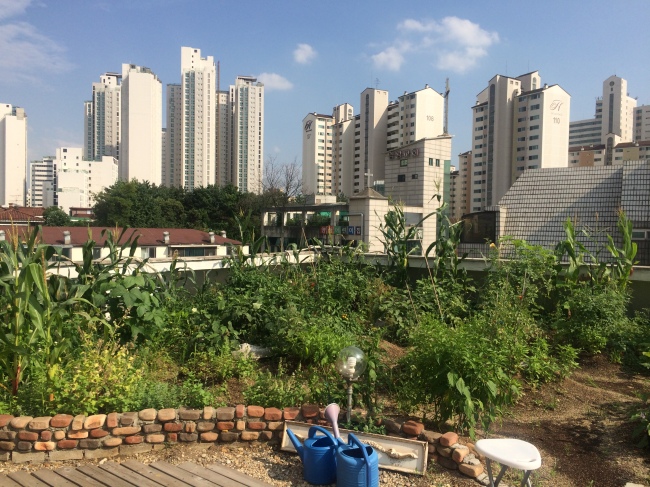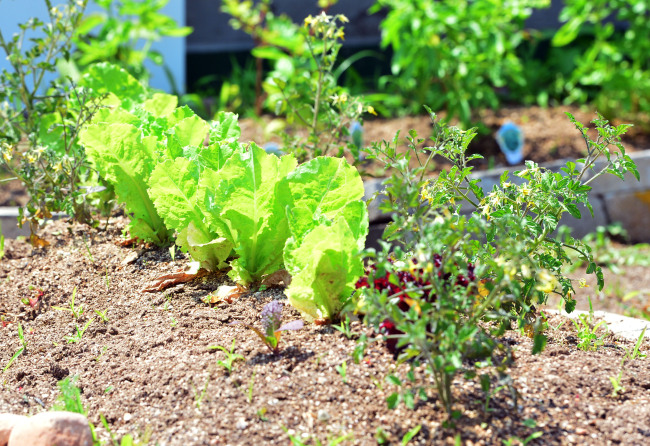[Weekender] Growing crops on rooftops
Urban farmers on the rise, with more city dwellers seek healthy food and comfort in farming
By KH디지털2Published : June 3, 2016 - 15:34
Rows of carrots, onions, lettuce and herbs stretch across the 198-square-meter concrete rooftop of a typical four-story office building, against a backdrop of high-rise apartment blocks.
The sight surprised 35-year-old Park Hyun-ho when he discovered it near his multistory residential building in one of the most densely populated areas of Mapo-gu, Seoul. The farm is run by Pajeori, a nonprofit organization registered with the Seoul Metropolitan Government.
“Farming in Seoul is an unusual thing, especially farming on a rooftop,” said Park.
He is one of an increasing number of urban farmers joining the rooftop farming movement.
The sight surprised 35-year-old Park Hyun-ho when he discovered it near his multistory residential building in one of the most densely populated areas of Mapo-gu, Seoul. The farm is run by Pajeori, a nonprofit organization registered with the Seoul Metropolitan Government.
“Farming in Seoul is an unusual thing, especially farming on a rooftop,” said Park.
He is one of an increasing number of urban farmers joining the rooftop farming movement.

The number of such individuals has grown almost 8.5 times from 150,000 in 2010 to 1.3 million in 2015, according to the Ministry of Agriculture, Food and Rural Affairs.
Park, who works in the printing business, is now a part-time farmer in the daytime. He educates Pajeori members on farming techniques and guides them throughout the yearlong farming cycle from the planting of seeds to harvest.
“It brought a huge change to my daily life. I began to feel healthy again as I spend time in the sun taking care of crops here,” he said. Park usually works at night and had previously spent the mornings and early afternoons sleeping at home.
Pajeori, short for “fresh green young people” in Korean, started as a small hobby group of young college students in 2012. Despite frequent changes in members, it has continued to attract new members who seek relaxation and comfort in farming amid the hectic pace of urban life.

The organization has since grown in size, with 100 members who take turns tending the crops on the rooftop in Mapo-gu and on a plot of land in Nodeulseom Island, an artificial island on the Hangang River.
“Our motto is ‘Farming is play,’” said Kim Na-hee, the director of Pajeori who joined the group in 2014.
“It is really nice and fun growing your own crops. I remember it was the only way I could find relief from the stress of work and relax,” she said.
At Dari, another rooftop farm near Hongik University Station, some 40 members own “boxes” of land on the rooftop of the Catholic Youth Center in Mapo-gu, Seoul.
Each member is allocated a box-sized space where they can grow crops. Popular ones include tomatoes, paprika, ginger, eggplants and rucola, according to Park Jeong-ja, an urban farmer and educator, who manages the place.

“The reason people turn rooftops into farms is that there is no available space on the ground for farming in the city. If you have a spare piece of land in the city, it’s considered a source of investment, not a farm,” said Park.
She has seen a growing number of people who want to try farming on rooftops.
“More people are interested in the food they eat. We have chefs who want to learn about vegetables they cook and citizens who want to grow vegetables organically,” said Park.
Park holds farming lectures twice a month for some 40 members and sometimes invites professionals who lecture on techniques.
Businesses are also hoping on the bandwagon. In 2014, Hyundai Card’s chefs began growing vegetables at the rooftop of the company headquarters in Yeouido, Seoul. The produce is harvested and used in preparing meals served at the cafeteria for staff.

The chefs grow more than 30 kinds of crops, including herbs such as basil, mint, rosemary and thyme, as well as carrots, tomatoes, cucumbers, pumpkins, beans and blueberries. The rooftop farm also serves as a rest area for employees who are allowed to take fruit from it during their breaks.
Small-scale rooftop farming has its benefits -- it doesn’t attract harmful insects which are the bane of large farms.
“We don’t really have to use pesticides here. Insects become a problem when a single type of crop is planted on a vast lot that eventually loses biodiversity. Here, we have a variety of crops that each prevents harmful insects, said Kim, who studied landscape and gardening at college.
Pajeori members grow 15 types of crops on the rooftop space. They plant different crops each season: lettuce and potatoes in spring; tomatoes, eggplants, chili peppers, corn in summer; cabbage and radish in the fall. Winter is a time of rest for both urban farmers and the soil.

Kim said urban farming takes patience just like regular farming.
“It took three years for the soil to have enough organic matter inside,” she said. “I heard the first year was difficult. The soil was too loose to hold the plants.”
“Now there is enough good organic matter within the soil, and we have also begun to see ants, which we didn’t see in the beginning,” she added.
By Lee Woo-young (wylee@heraldcorp.com)


![[AtoZ into Korean mind] Humor in Korea: Navigating the line between what's funny and not](http://res.heraldm.com/phpwas/restmb_idxmake.php?idx=644&simg=/content/image/2024/04/22/20240422050642_0.jpg&u=)
![[Exclusive] Korean military set to ban iPhones over 'security' concerns](http://res.heraldm.com/phpwas/restmb_idxmake.php?idx=644&simg=/content/image/2024/04/23/20240423050599_0.jpg&u=20240423183955)



![[Graphic News] 77% of young Koreans still financially dependent](http://res.heraldm.com/phpwas/restmb_idxmake.php?idx=644&simg=/content/image/2024/04/22/20240422050762_0.gif&u=)
![[Herald Interview] Why Toss invited hackers to penetrate its system](http://res.heraldm.com/phpwas/restmb_idxmake.php?idx=644&simg=/content/image/2024/04/22/20240422050569_0.jpg&u=20240422150649)





![[Exclusive] Korean military to ban iPhones over security issues](http://res.heraldm.com/phpwas/restmb_idxmake.php?idx=652&simg=/content/image/2024/04/23/20240423050599_0.jpg&u=20240423183955)



![[Today’s K-pop] Ateez confirms US tour details](http://res.heraldm.com/phpwas/restmb_idxmake.php?idx=642&simg=/content/image/2024/04/23/20240423050700_0.jpg&u=)